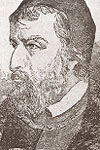The page of Mendes Pinto, Fernão , English biography
Biography
Fernão Mendes Pinto (Old Portuguese: Fernam Mendez Pinto); (Montemor-o-Velho, 1509?-Pragal, Almada, 1583) was a Portuguese adventurer, explorer and writer, whose exploits are known to history through the posthumous publication of his memoir, "Pilgrimage", ("Peregrinação" in Portuguese), in 1614 — an autobiographical work whose validity is nearly impossible to assess. In the course of his adventures in the Far East, Pinto visited Ethiopia, the Arabian Sea, China (spending time in forced labor on the Great Wall), India, and Japan, and claimed to have been among the first group of Europeans to land in that country, initiating the Nanban trade period. Pinto also claimed to have introduced the gun to Japan in 1543, and was known to have funded the first Christian church in that country, after befriending a Catholic missionary and founding member of the Society of Jesus who would later be known as Saint Francis Xavier. Pinto himself was at one time himself a Jesuit, though he later separated from the order.In Pilgrimage, Pinto was sharply critical of Portuguese colonialism in the Far East, recording moral and religious objections to what he perceived to be a hypocritical and greedy enterprise disguised as a religious mission, a view that would later become common but at the time was relatively unknown. The vivid tale of Pinto's two decades of wanderings (he wrote, "thirteen times made captive and seventeen times sold") was so unusual that for some time it was not believed, giving rise to the Portuguese pun on his name: "Fernão, Mentes? Minto!" meaning "Fernão, do you lie? Yes, I lie!"
http://en.wikipedia.org/




